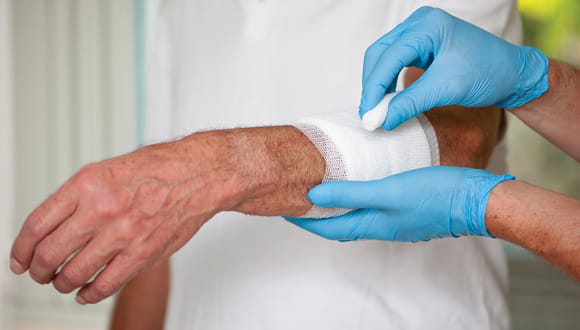5 Signs a Wound Is Serious & Requires Medical Attention
June 20, 2022 - Katie McCallumMost wounds are minor cuts and scrapes that — with the right care — you can handle on your own at home.
But some wounds are more serious.
"It's important to take care of any open wound, but some wounds require medical attention in order to heal effectively and ensure they don't become infected," says Dr. Michael Yaakovian, a surgeon and wound care specialist at Houston Methodist.
But how do you know if a wound is serious enough to warrant medical attention?
1. It's a deep laceration or puncture
"If the wound is deep and you can see fat or underlying structures, like tendon or muscle, you should definitely seek medical attention," says Dr. Yaakovian. "It likely needs to be closed. If it's dirty, it may need to be irrigated, and antibiotics may be administered."
These more serious wounds also sometimes require debridement, which is when dead tissue or other materials that may promote infection are removed.
A deep puncture is also a concern because underlying organs could be damaged. In addition, puncture wounds caused by rusty nails are at risk for tetanus infection — so you may need to a tetanus shot if you're overdue.
2. It was caused by an animal
"With animal bites, we often start oral antibiotics right away since the chance of the wound becoming infected is high," adds Dr. Yaakovian.
For instance, several illnesses can be spread through animal bites, including:
- Rabies
- Cellulitis
- Staph and strep infections
If closure is needed, it may be delayed and the wound left open until your care team is confident there's no risk for infection.
3. It shows signs of infection
Whether it's a surgical wound or one that seemed minor at first but is getting worse instead of better, any wound that's infected should be evaluated by a medical provider.
Signs a wound may be infected include:
- Increasing pain or redness
- Drainage or bleeding that won't stop
- Fever and chills
"Depending on the stage of the wound and severity of infection, either oral antibiotics will be prescribed or an IV antibiotic drip may be initiated," explains Dr. Yaakovian. "Your provider may also debride any nonviable tissue that might be promoting the infection."
4. It's not healing
A chronic wound is any wound that lasts longer than three weeks, but Dr. Yaakovian says wounds should start showing signs of improvement within a few days.
"If your wound isn't healing after two or three days, we start to worry whether it may end up being a chronic wound," says Dr. Yaakovian.
Spotting a chronic wound early can help heal it faster.
"These wounds typically need more than the body's own mechanisms of healing or the conventional steps you use to treat a wound yourself at home, like ointment and bandages," explains Dr. Yaakovian.
(Related: Should You Put Hydrogen Peroxide on a Cut or Scrape?)
For instance, there are many different types of wound dressings that wound care experts can use to help wounds heal.
"You don't want wounds to be too wet, but you also don't want them to be too dry," says Dr. Yaakovian. "We have many different types of dressings that can help maintain the proper level of moisture that promotes healing."
5. You're prone to non-healing wounds
Even a minor wound can be more serious for a person who has:
- Diabetes
- A weakened immune system (immunocompromised)
"These medical issues make a person more prone to wound infection," explains Dr. Yaakovian. "Since these wounds can progress more rapidly, people with these conditions are more likely to need antibiotics and debridement — so early evaluation and treatment is key."
Given this, he says that these individuals may even need to have a seemingly minor wound checked out.
"I would say seek attention for any wound if you have one of these conditions," Dr. Yaakovian warns. "Especially if you're diabetic and have a wound on your foot. This is a common complication of diabetes that can quickly turn bad."


